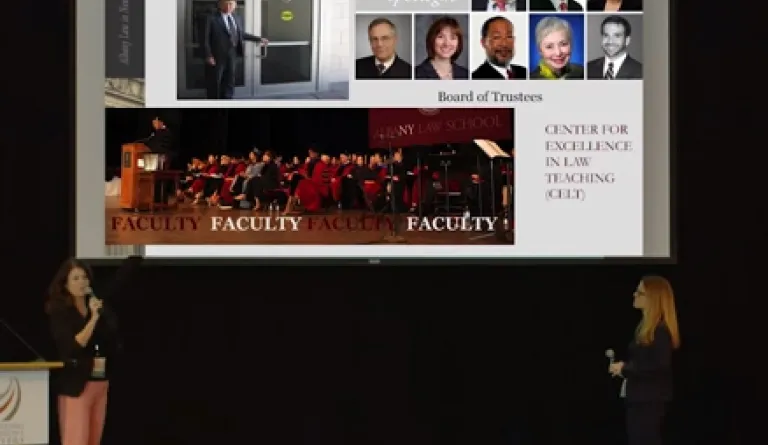ETL Ignite: Inclusive Strategic Planning and Faculty Adoption of Learning Outcomes

This post is one of a series that stems from our 4th Annual Educating Tomorrow's Lawyers Conference. The author(s) presented a six-minute Ignite-style presentation at the conference that discussed the innovations and outcomes of their school’s classes, programs, or curricula—or within the realm of legal education more broadly. The videos will be available here and in our Resources section as they become available.
On October 1, we came from Albany Law School to present on “How an Inclusive Strategic Planning Process Leads to Faculty Adoption of Institutional Student Learning Outcomes” at the 4th Annual Educating Tomorrow’s Lawyers Conference in Denver, Colorado.
Albany Law’s process of developing learning outcomes began years ago with a conference hosted by Albany Law’s Center for Excellence in Law Teaching (CELT) on “Setting and Assessing Learning Objectives from Day One.” With the momentum and knowledge from the CELT conference and the development of the Albany Law Strategic Plan, which emphasized that “a competency-based curriculum ensures that students achieve the core knowledge and transferable skills necessary to succeed in a fast changing environment,” Albany Law set out to develop an inclusive and engaged process of developing institutional learning objectives, which began with the appointment of a Faculty Assessment Committee.
Tasked with 1) developing Student Learning Outcomes or Competencies; 2) creating methods and processes for evaluating and assessing student achievement of identified competencies; and 3) determining how and when to communicate progress to appropriate constituencies, the Committee engaged its alumni, its Career and Professional Development Office, and the Albany Law faculty in a process of meeting in groups to determine what knowledge, skills, and values our students should master before graduating from Albany Law School.
After various drafts, the faculty unanimously approved its institutional learning outcomes that can be found here.
This presentation describes Albany Law’s process and the Committee’s continued work on more specific outcomes for its Opportunity Pathways as well as creating methods and processes for evaluating our students’ achievement of those outcomes.
We welcome the opportunity to collaborate with our fellow ETL consortium schools on the process of developing and measuring student learning outcomes.

